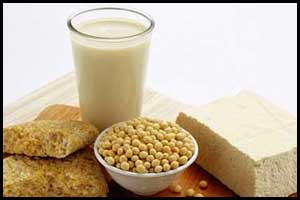- Home
- Editorial
- News
- Practice Guidelines
- Anesthesiology Guidelines
- Cancer Guidelines
- Cardiac Sciences Guidelines
- Critical Care Guidelines
- Dentistry Guidelines
- Dermatology Guidelines
- Diabetes and Endo Guidelines
- Diagnostics Guidelines
- ENT Guidelines
- Featured Practice Guidelines
- Gastroenterology Guidelines
- Geriatrics Guidelines
- Medicine Guidelines
- Nephrology Guidelines
- Neurosciences Guidelines
- Obs and Gynae Guidelines
- Ophthalmology Guidelines
- Orthopaedics Guidelines
- Paediatrics Guidelines
- Psychiatry Guidelines
- Pulmonology Guidelines
- Radiology Guidelines
- Surgery Guidelines
- Urology Guidelines
FDA's 1999 claim of soy as cholesterol lowering diet still valid, finds JAMA study

Canada: A recent study published in the JAMA journal has backed FDA's 1999 heart health claims of the cholesterol-lowering effect of soy protein, however, the effect of soy alone is modest.
The study found that soy consumption has continued significance in the reduction of total cholesterol and low‐density lipoprotein cholesterol. According to the findings, Low-Density Lipoprotein Cholesterol (LDL cholesterol) reductions for soy protein has consistently been between −4.2 and −6.7 mg/dL, with no loss of significance at any time point, so justifying the continued use of soy for health and therapeutic purposes as part of cholesterol‐lowering diets. This supports the rationale behind the original soy FDA heart health claim.
Soy protein as a food source has attracted attention for over 40 years as a useful plant protein foods having cholesterol‐lowering properties. But there is a lack of consistency in significant cholesterol reduction by soy in 46 randomized controlled trials. On the basis of which, the US Food and Drug Administration (FDA) has proposed to revoke the heart health claim status which stated that --- 25 grams of soy protein a day, as part of a diet low in saturated fat and cholesterol, may reduce the risk of heart disease by lowering Low-Density Lipoprotein Cholesterol.
David J. A. Jenkins, Department of Nutritional Sciences, Faculty of Medicine, University of Toronto, Ontario, Canada, and colleagues using a cumulative meta‐analysis, assessed whether at any time point since 1999 had soy foods failed to lower serum cholesterol.
Investigators conducted a cumulative meta-analysis on the 46 trials selected by the FDA for reanalysis of the soy health claim. Investigators noted that data was extracted by 2 independent reviewers.
Investigators tracked the progression of evidence on the association between soy protein intake and lip markers to determine if there was a change since the FDA published the health claim in 1999. Of the 46 selected studies, 2 reported data on neither total cholesterol or LDL-C and 1 was a subsidy of a larger study already included.
Also Read: Soy protein lowers Low-density lipoprotein cholesterol and CVD risk
Key findings of the study include:
- The cholesterol-lowering effect was consistent across all 46 trials that the FDA cited in 2017, which was when the agency first proposed revoking the health claim for soy-based on variability among the results of recent trials.
- After examining the 43 remaining trials, investigators found that mean reduction of Low-Density Lipoprotein Cholesterol(LDL-C) in 1999 was -6.3mg/dL and remained in the range of -4.2 to -6.7 mg/dL in the years following 1999.
- At no time, did the cholesterol or Low-Density Lipoprotein Cholesterol (LDL-C) reductions lose significance.
- There were no differences at individual time points in the meta-analysis significantly different from those seen in 1999.
Also Read: Study suggests , Soya foods decrease risk of atherosclerosis
Investigators purport that their findings support the original health claim made by the FDA and added that the FDA’s decision to examine the health claim surrounding soy is both disheartening and could result in a shift that undermines plant-based proteins.
"These data strongly support the rationale behind the original FDA heart health claim for soy," said David Jenkins, MD, PhD, professor of nutritional sciences and professor of medicine at the University of Toronto. "And it's important to note that while the reduction in cholesterol was less than five percent if you put that together with other plant-based foods in a portfolio you get a much stronger effect."
"Soy continues to have a significant, if modest, effect in reducing serum Low-Density Lipoprotein Cholesterol (LDL‐C) as a cardiovascular disease risk factor. The effect of soy alone is modest, but it may produce a clinically meaningful reduction when combined in the diet with other FDA‐approved cholesterol‐lowering foods. Furthermore, at a time when plant protein sources are required, soy protein provides a useful plant protein source for the food industry, with a range of applications and with the production of heart-healthy foods being one of them," concluded the authors.
To read the complete stud follow the link: https://doi.org/10.1161/JAHA.119.012458

Disclaimer: This site is primarily intended for healthcare professionals. Any content/information on this website does not replace the advice of medical and/or health professionals and should not be construed as medical/diagnostic advice/endorsement or prescription. Use of this site is subject to our terms of use, privacy policy, advertisement policy. © 2020 Minerva Medical Treatment Pvt Ltd